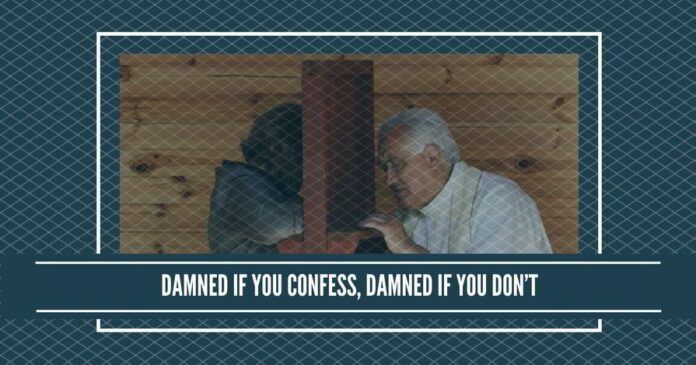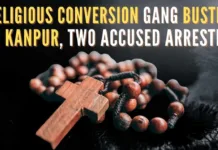
The question that needs to be asked, is: Will priests who have abandoned the path of god and indulged in crimes as heinous as rape and blackmail, also get away if they ‘confess’?
The Church in India, recently hit by a series of sex scandals, has had a tough enough task in damage control. The last thing it would have wanted is a challenge to its age-old conventions that have become an intrinsic part of the Christian faith. And so, when the National Commission for Women (NCW) chairperson demanded that the practice of ‘confession’ should be abolished, the Church naturally took offense. And not just the Church, even prominent members of the Christian faith, including a Union Minister, strongly objected to the demand.
Based on the writing of early Fathers, it can be said that the Church recognized the authority and power of apostolic successors to absolve the sinful of his or her sins in case a confession is made.
The NCW, in its report submitted to the Union Home Ministry on two sex scandals that surfaced in June, involving Christian clergy, recommended that ‘confessions’ by women to males priests be brought to an end. The specific trigger for the recommendation was the revelation by a victim, who said that three priests of the Orthodox Church had sexually abused her by using her confessional statement, in which she spoke of a pre-marital relationship she had had with a fourth priest. The NCW chief said that “women cannot share their private life with priests”.
Interestingly, social activist Swami Agnivesh has backed the demand. He said: “It is absurd that a practice meant to absolve people of their sins is used to push them deeper and deeper into degradation.” But he added that the NCW must be consistent in other similar matters involving religious leaders of other faiths. He stated, “Given the political clout of the Church in Kerala, it is imperative that this task (of probing the sex scandals) be entrusted to the Central Bureau of Investigation.”
Expectedly, the Catholic Church has condemned the NCW demand. President of Catholic Bishops Conference of India (CBCI), Cardinal Oswald Gracias, said he was “shocked” by the recommendation, and added that the demand “betrays a total lack of understanding of nature, meaning, sanctity and importance of this sacrament for our people…”
Also expectedly, a debate has ensued over whether the ‘confession of sins’ by the faithful to a priest — in secret — to receive absolution, is an inalienable part of the Christian faith, or is the practice an invention of the Church. It is a matter of record that confessing one’s sins is a mandate from Jesus Christ. Based on the writing of early Fathers, it can be said that the Church recognized the authority and power of apostolic successors to absolve the sinful of his or her sins in case a confession is made. But those confessions were of a public nature. However, ‘private confession’ is a relatively new concept, and it became universally known and practiced from the seventh century onwards. And given the privacy involved, it always had the potential to be misused.
“If any one saith, that the sacraments of the New Law were not all instituted by Jesus Christ, our Lord; or that they are more, or less, than seven to wit… or even that any one of these seven is not truly and properly a Sacrament; let him be anathema.”
Also, the manner in which these ‘confessions’ evolved — from public to private, and assuming the form of a Sacrament — is certainly the Church’s doing. The Catholic Church, as well as a few other orders, recognize ‘confessions’ as one of the seven sacraments — the six others being Baptism, Holy Communion (Eucharist), Confirmation, Marriage, Holy Orders and Anointing of the Sick. Confession is categorized as Reconciliation (Confession or Penance). Many Protestant denominations believe in two Sacraments — Eucharist and Baptism, whereas the Lutheran order, while having these two, also includes Confession (and Absolution) as its third Sacrament. But there are also some, though very few in number, who simply don’t believe in Sacraments as essential to the faith, but consider them as ‘reminders’ of good conduct and ‘commendable practices’.
As the word ‘Sacrament’ indicates, it denotes the meaning of ‘sacred’, having derived from Sacramentum, which in turn comes from the Latin Sacro (meaning hallow) and Sacer (holy). Perhaps foreseeing that someday, somebody from the faith could challenge the Sacraments as not given by Christ, Canon One in the documents codified in the Council of Trent (1545-1563), stated: “If any one saith, that the sacraments of the New Law were not all instituted by Jesus Christ, our Lord; or that they are more, or less, than seven to wit… or even that any one of these seven is not truly and properly a Sacrament; let him be anathema.” With this unambiguous warning delivered, there wasn’t really a chance that any Christian faithful, of the Orthodox or the Catholic order, would dare to question even private confessions as un-Christ-like.
The crux of the argument in favor of continuing with the practice of private confessions is that such a confession of serious sins is essential for a person once he or she has been baptized. In the present context, the question that needs to be asked, is: Will priests who have abandoned the path of god and indulged in crimes as heinous as rape and blackmail, also get away if they ‘confess’? Or are they above ‘confessions’? As we have seen so far, not one among those who stand accused has admitted to the crime. Thankfully, the law of the land could not be less bothered whether they confessed in the sacramental sense or not; the law of the land will take its own legal course.
Note:
1. The views expressed here are those of the author and do not necessarily represent or reflect the views of PGurus.











Raising Church issues is a master stroke. Surveillance in many institutions has been neglected or given benefit of doubt for a long time now (almost 5 decades of negligence). Time to improve monitoring mechanism & catch, investigate things before they hit headlines.
Yes, it is called ABSOLUTION. One can commit the most henious crimes and get away with it by getting absolution from the church. The Vatican has enough skeletons in its closet!!
“Confessing ones sins is a mandate from J Christ” is based on manipulated belief. After all Bible was composed nearly after 400 years of his demise with additions and deletions all in the name of a prophet. Further definition of sin is vague and merely by confessing if so called sins are absolved then what is the need for man made criminal laws and what is the role of god. In case of sanatana dharma, sin is not defined but every act is covered by karma, and he reaps benefits or suffers from such an act. Only a guru ( not modern ) and devatas can give relief to suffering karma. Well we are all supposed be sinners, though we are born by chance and not by choice.
But why the hell somebody should confess to a human being? Are they Gods? And should God forgive anyone of a crime? And if that God does then he is not a God. It is an extortion.
Iam surprised that what was really told by NCW chairperson did not come as clear as said in PGURUS. Please tell Mr.Mohandass to highlight it. No media in Kerala or elsewhere said that the confession by female church goer should not be made to a male priest. Here the NCW was clear what they mean. But the Media in KERALA never said this . The same is the case with National Channels.